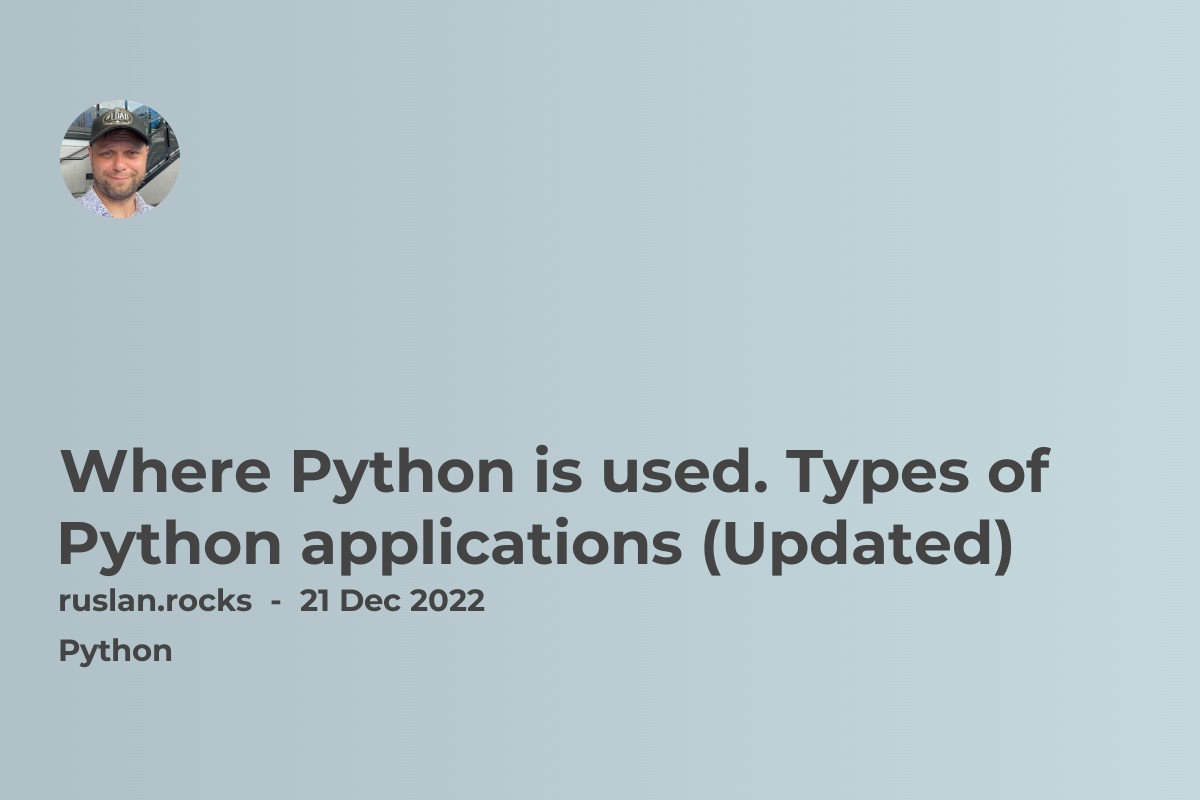- Who created Python
- Where Python is used for
- How quick you can learn Python
- Is Python an object-oriented language?
- Python in web development
- Python in machine learning
- Data science and Python
- Keywords in Python
- Python global variables
- Python applications for web scraping
- Python while loop
- Automation with Python
- Python and artificial intelligence
- Python developers' salary trend
- Famous software is written in Python.
- Python in game development?
- Useful links

Python is used in many contexts. It is used by programmers, software engineers, system administrators, software testers and anyone who needs to write code.
Python has become popular among developers because of its readability and extensive library with modules that support programming tasks and other languages.
Python is a general-purpose and object-oriented programming language. Python is commonly used to automate tasks, write scripts and create user interfaces.
Some common uses of python are as follows:
-
Clients: Users can interact with their databases using Python scripts or APIs like Django or SQLAlchemy. This makes it easy to build business logic using only code instead of writing several different lines of code for each task.
-
Web frameworks: Users can use frameworks like Flask or Tornado to create websites very quickly with less coding than if they used a more complicated framework from scratch. These frameworks also make it easier to share code between users so that you do not need to reinvent the wheel every time you want your website to function the same way as someone else's website does.
-
Scientific computing: Some users use Python for matrix calculations rather than Fortran, C or other languages for similar purposes because Fortran can be difficult for some people to understand and use. Another reason some scientists choose Python over other languages for scientific programming is that it supports object-oriented programming, which helps them structure their programs better and improves the readability and maintainability of their codes.
Who created Python
Guido van Rossum is a Dutch programmer best known for creating the Python programming language. Python is a widely used, general-purpose, interpreted, high-level programming language. Its design philosophy emphasizes code readability, and its syntax allows developers to express concepts in fewer lines of code than possible in languages such as C++ or Java.
Where Python is used for
Python is used in many contexts. It is used by developers, software engineers, system administrators, software testers and anyone who needs to write code. Python has become popular among programmers because of its readability and an extensive library with modules that support programming tasks and other languages.
How quick you can learn Python
Python is an easy programming language to learn. Learning how to program with Python requires much less time than learning other languages like C++ or Java. This makes it an excellent choice for people who do not have the time to learn a complicated language. This language can be learned in just one day, and its syntax is almost identical to English syntax, making it easier to use on the fly while programming.
Is Python an object-oriented language?
Python is a general-purpose and object-oriented programming language. Here, objects can be thought of as "black boxes" that you can use to execute code, take input, and produce output. For instance, an object may have a function called "greeting", which outputs something like "Hello!" when called. The following are the most common types of objects in Python:
-
Sequences: sequences of values with no order defined by the programmer; they may also be infinite or finite. For example, if you want to create a list of integers in Python, write the following code: list = [] for x in range(10): list.append(x)
-
Lists: lists are sequences of items where each item has its index value and can also be accessed by its index value or position within the list. For example, if you want to create a list containing ten numbers where the first number is five and the list will end with 20, then your code would look like this: list = [5, 6, 7] list[1] = 20
-
Tuples: tuples are immutable collections of homogeneous items with no order defined by the developer. The items in a tuple cannot be changed once created and cannot be assigned any other values except themselves. For example, if you wanted to create a tuple that contained two strings "python
Python in web development
Python is a universal language that can be used for web development. It has several libraries and frameworks that can be used to build web applications. Python is also not hard to learn, making it a good choice for those new to web development. You can use any algorithms with Python.
Python in machine learning
Python is a widely used high-level interpreted language that has become increasingly popular in machine learning. Python is easy to learn for beginners and has many modules and libraries that allow for robust machine learning applications. Additionally, Python integrates well with other languages and can be used with frameworks like TensorFlow to create powerful machine learning models.
Data science and Python
Python is a popular programming language in many fields, including data science. Data science is a field that relies heavily on computer programming and statistical analysis to extract knowledge and insights from data. Python is a popular language for data science because it is easy to learn and has many robust data analysis and machine learning libraries.
Data scientists love Python because it has many built-in libraries for data analysis, machine learning, and visualization. Also, Python is relatively easy to learn for beginners.
Scientists prefer Python because it is easy to read and understand. Python also has a very active community of users who are always willing to help with any issues you may have.
Also, Python has a wide range of modules you can use to make your life as a scientist much easier.
Keywords in Python
Python is a general-purpose and object-oriented programming language. Python has keywords like print, if, and while that you can use to write scripts and create user interfaces. Some keywords in Python are "*print", "*if", "*while", "*for", "*try", "*except", "*return", "*def", "*class", "*pass", "*raise", "*with", "lambda".
Python global variables
Python has its own set of global variables, providing many language features. This allows developers to use Python as a scripting language, making it easier for them to automate their tasks and create user interfaces more quickly. Some of these variables include
-
name: is the name that Python assigns to the program when it's started
-
execfile(): runs a file as a program, treating it as a text string (e.g. "python test.py")
Python applications for web scraping
Python is one of the most popular languages for automating tasks and building user interfaces. One of these tasks is by using python web scraping. This can be done by using the urllib module. Python comes with a library called urllib, which helps users perform HTTP requests. Users can write python code that will scrap data from websites and store it in JSON files or databases for later use.
Python while loop
The python while loop statement is used to iterate through a code block. The code will run as long as the condition being tested is true. This loop is frequently used with lists, where it iterates over each element in the list one at a time and performs an action when each item in the list is encountered. For example, let's say you want to output all the even numbers from 1-100: for i in range(1, 101): print (i)
Automation with Python
Automation is creating a system that can work without human intervention. In software development, automation refers to the use of tools and processes to automate the creation and delivery of software.
Python is a widely used, general-purpose programming language that is well suited for creating automation scripts and tools. Python's syntax is relatively simple and easy to learn, which makes it a good choice for scripting and automating tasks.
Python and artificial intelligence
Python is used in many artificial intelligence projects. For example, it is used in Google's self-driving car project and NASA's Mars rovers.
Python is also used in many scientific computing projects, such as mathematics, statistics, and machine learning.
Python developers' salary trend
Python developers are in high demand. Here's a look at the salary trends for Python developers: In 2018, the median salary for a Python developer was $100,000 A 10-year trend shows that wages for Python developers have increased by about 43 per cent.
Famous software is written in Python.
The most famous software written in python is the open source programming language known as Django. The Django website is a server-side, Object Oriented web framework used to build websites. Other famous applications of the Python programming language are Numpy and Scipy, both platforms for scientific computing and scientific data visualisation, respectively.
The significant advantage of using Python is its readability. It's easy for developers to write code which means it's also easy for other people to understand and use. Furthermore, Python is an open-source programming language.
Many libraries are available with modules that support functionality from other languages such as C# or Java so that you can use those languages when writing your application without having to learn all the complexities of those languages in the process.
Python in game development?
Python is a versatile language used for various purposes, including game development. While there are many game engines and frameworks available that can be used with Python, it is also possible to create games from scratch using nothing but Python code. This makes Python an attractive option for game developers, as it is relatively easy to learn and use.
Useful links
Official website: https://www.python.org/
PIP: https://pypi.org/project/pip/

